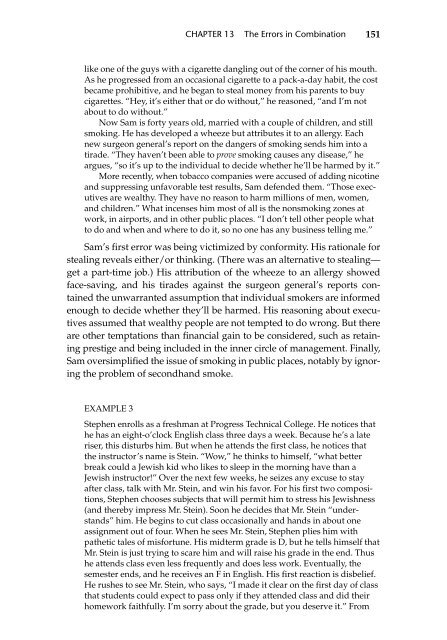Beyond Feelings
Beyond Feelings
Beyond Feelings
You also want an ePaper? Increase the reach of your titles
YUMPU automatically turns print PDFs into web optimized ePapers that Google loves.
CHAPTER 13 The Errors in Combination<br />
151<br />
like one of the guys with a cigarette dangling out of the corner of his mouth.<br />
As he progressed from an occasional cigarette to a pack-a-day habit, the cost<br />
became prohibitive, and he began to steal money from his parents to buy<br />
cigarettes. “Hey, it’s either that or do without,” he reasoned, “and I’m not<br />
about to do without.”<br />
Now Sam is forty years old, married with a couple of children, and still<br />
smoking. He has developed a wheeze but attributes it to an allergy. Each<br />
new surgeon general’s report on the dangers of smoking sends him into a<br />
tirade. “They haven’t been able to prove smoking causes any disease,” he<br />
argues, “so it’s up to the individual to decide whether he’ll be harmed by it.”<br />
More recently, when tobacco companies were accused of adding nicotine<br />
and suppressing unfavorable test results, Sam defended them. “Those executives<br />
are wealthy. They have no reason to harm millions of men, women,<br />
and children.” What incenses him most of all is the nonsmoking zones at<br />
work, in airports, and in other public places. “I don’t tell other people what<br />
to do and when and where to do it, so no one has any business telling me.”<br />
Sam’s first error was being victimized by conformity. His rationale for<br />
stealing reveals either/or thinking. (There was an alternative to stealing—<br />
get a part-time job.) His attribution of the wheeze to an allergy showed<br />
face-saving, and his tirades against the surgeon general’s reports contained<br />
the unwarranted assumption that individual smokers are informed<br />
enough to decide whether they’ll be harmed. His reasoning about executives<br />
assumed that wealthy people are not tempted to do wrong. But there<br />
are other temptations than financial gain to be considered, such as retaining<br />
prestige and being included in the inner circle of management. Finally,<br />
Sam oversimplified the issue of smoking in public places, notably by ignoring<br />
the problem of secondhand smoke.<br />
EXAMPLE 3<br />
Stephen enrolls as a freshman at Progress Technical College. He notices that<br />
he has an eight-o’clock English class three days a week. Because he’s a late<br />
riser, this disturbs him. But when he attends the first class, he notices that<br />
the instructor’s name is Stein. “Wow,” he thinks to himself, “what better<br />
break could a Jewish kid who likes to sleep in the morning have than a<br />
Jewish instructor!” Over the next few weeks, he seizes any excuse to stay<br />
after class, talk with Mr. Stein, and win his favor. For his first two compositions,<br />
Stephen chooses subjects that will permit him to stress his Jewishness<br />
(and thereby impress Mr. Stein). Soon he decides that Mr. Stein “understands”<br />
him. He begins to cut class occasionally and hands in about one<br />
assignment out of four. When he sees Mr. Stein, Stephen plies him with<br />
pathetic tales of misfortune. His midterm grade is D, but he tells himself that<br />
Mr. Stein is just trying to scare him and will raise his grade in the end. Thus<br />
he attends class even less frequently and does less work. Eventually, the<br />
semester ends, and he receives an F in English. His first reaction is disbelief.<br />
He rushes to see Mr. Stein, who says, “I made it clear on the first day of class<br />
that students could expect to pass only if they attended class and did their<br />
homework faithfully. I’m sorry about the grade, but you deserve it.” From


